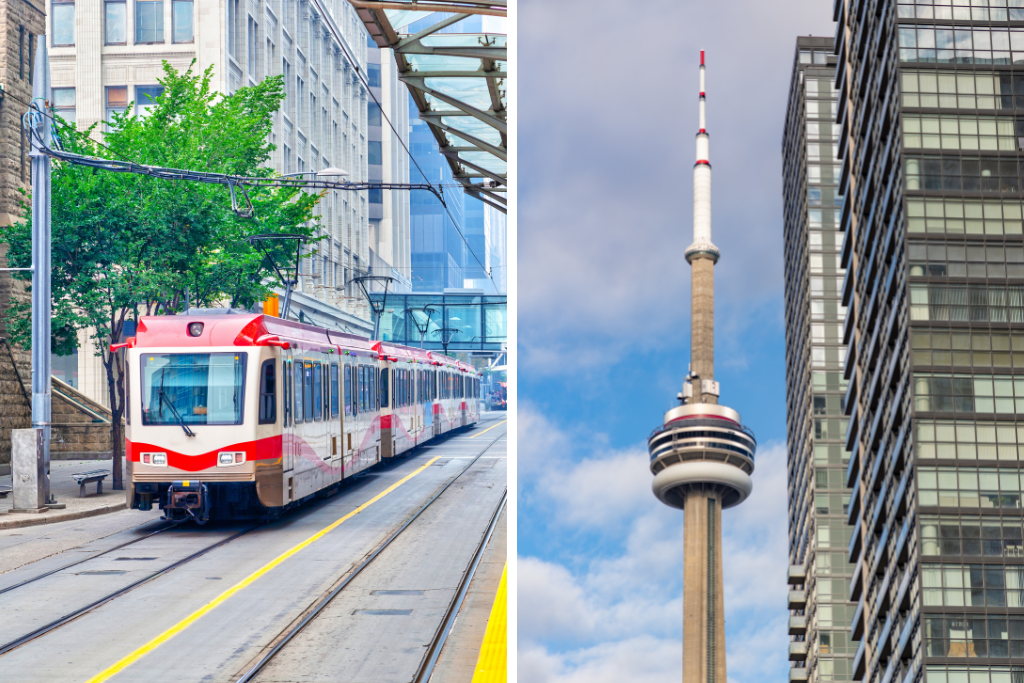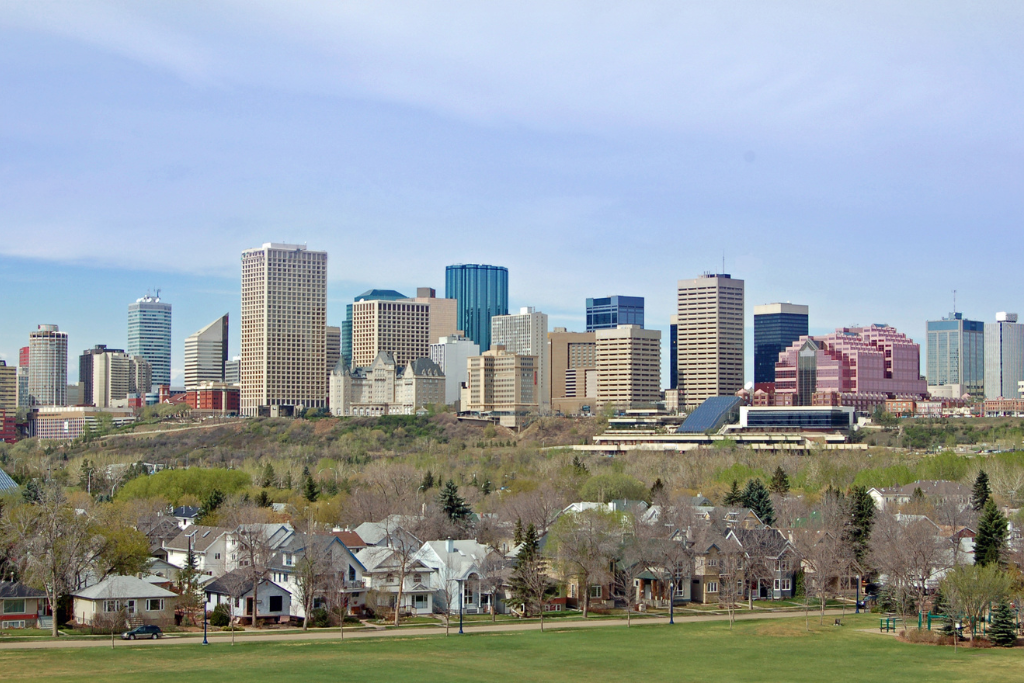Public transit in Edmonton vs. Vancouver
In Edmonton, the Edmonton Transit Service (ETS) is a convenient public transportation system that serves over 80 million rides per year. It plays a vital role for its residents and provides seamless connections inside the city and the surrounding areas. Meanwhile, TransLink operates Vancouver’s public transportation network, including buses, SkyTrain, SeaBus, and the West Coast Express commuter rail, offering efficient regional travel throughout Metro Vancouver.
Public transit in Edmonton
The ETS offers buses, LRT (Light Rail Transit), and para-transit services. Arc functions as the electronic fare system for buses and LRT, including tickets and reloadable cards used to tap on validators when riding buses and LRT. Tickets and passes are also purchasable through the ETS Online Store.
Public transit fares in Edmonton
|
Type of fare |
Rate |
|
Single ticket (90 minutes) |
$2.75 |
|
10 Ticket pack |
$27.75 |
|
Daily pass |
$10.25 |
|
Monthly pass |
$100 |
|
Family Pass (Up to 5 people) |
$10.25 |
ETS Edmonton Transit Service (Sept 2023)
The ETS public transit cost of a monthly pass in Edmonton is $100.
Public transit in Vancouver
Vancouver’s Translink system is well-designed, convenient, and cost-effective, and includes the SkyTrain (an automated rapid transport system running above and below ground), the SeaBus (ferry service), and numerous bus routes. The city is divided into three fare zones, each with its own pricing structure. Trip planning, schedules, maps, and fare information are easily accessible on the Translink website.
Bus and Metro fares in Vancouver
|
Type of fare |
Rate |
|
Single ticket (1-Zone) |
$3.15 |
|
Single ticket (2-Zone) |
$4.55 |
|
Single ticket (3-Zone) |
$6.20 |
|
Daily pass (All Zones) |
$11.25 |
|
Monthly Pass (1-Zone) |
$104.90 |
Cost of groceries in Edmonton vs. Vancouver
The prices of groceries in Edmonton are approximately 17.64% lower than in Vancouver. The comparison of the cost of groceries in Edmonton and Vancouver is illustrated in the table below:
|
Groceries costs |
Edmonton |
Vancouver |
|
Milk (regular), (1 gallon) |
$8.99 |
$12.34 |
|
Loaf of Fresh White Bread (1 lb) |
$2.88 |
$3.88 |
|
Rice (white) (1 lb) |
$1.91 |
$2.48 |
|
Eggs (regular) (12) |
$4.15 |
$6.01 |
|
Local Cheese (1 lb) |
$6.69 |
$8.05 |
|
Chicken Fillets (1 lb) |
$6.95 |
$8.32 |
|
Beef Round (1 lb) |
$9.00 |
$8.78 |
|
Apples (1 lb) |
$2.58 |
$2.45 |
|
Banana (1 lb) |
$0.83 |
$0.86 |
|
Oranges (1 lb) |
$2.28 |
$2.26 |
|
Tomato (1 lb) |
$2.43 |
$2.58 |
|
Potato (1 lb) |
$1.35 |
$2.01 |
|
Onion (1 lb) |
$1.26 |
$1.56 |
|
Lettuce (1 head) |
$3.61 |
$3.56 |
|
Bottle of Wine (Mid-Range) |
$16.00 |
$20.00 |
|
Domestic Beer (0.5 liter bottle) |
$4.13 |
$4.22 |
|
Imported Beer (12 oz small bottle) |
$4.80 |
$4.58 |
|
Average monthly cost of groceries for 1 person |
$319.36 per month. |
$375.76 per month. |
Numbeo-Edmonton (Sep 2023) & Numbeo-Vancouver (Sept 2023)

What to do in Edmonton vs. Vancouver
Are you looking for something fun to do in both cities? We have got you covered.
Entertainment in Edmonton
Edmonton’s natural beauty, culture, history, and attractions appeal to many. Home to North America’s largest mall, Canada’s largest living history museum, and its largest historic park, the city offers diverse activities like skating, hiking, shopping, dining, and skiing. Close to Banff and Jasper national parks, Edmonton offers easy access to stunning natural landscapes.
Additionally, visitors can explore attractions such as the provincial museum, planetarium, Space and Science Center, Muttart conservatory greenhouses, and Fort Edmonton. Edmonton is known as “Festival City,” because it stages the largest Fringe Event (live theatre) in North America, the largest blues festival in Western Canada, and FolkFest, a large folk music festival. All of these take place outdoors during summers.
Entertainment in Vancouver
Vancouver’s natural beauty offers stunning ocean, mountains, and beaches resembling those of San Francisco and Los Angeles. Popular activities include biking, skiing, and sailing, with the sea-to-sky corridor connecting Vancouver and Whistler. Kitsilano Beach, Stanley Park, Granville Island, Grouse Mountain, and the Museum of Anthropology capture Vancouver’s carefree vibe. Family-friendly activities include the gondola to Grouse Mountain, Dr. Sun Yat-Sen Chinese Garden, and the Richmond Night Market.
As a larger city, Vancouver offers more educational options, good restaurants, shopping malls, and cultural events, making it an ideal choice for relocation.
Cost of entertainment in Edmonton vs. Vancouver
The cost of entertainment is relatively less expensive in Edmonton.
|
Entertainment costs |
Edmonton |
Vancouver |
|
Mid-range restaurant meal |
$50.00 |
$50.00 |
|
Taxi 1h |
$30.00 |
$40.00 |
|
1 cinema ticket |
$16.00 |
$18.00 |
|
Total |
$96.00 |
$108.00 |
Numbeo-Edmonton (Sept 2023) & Numbeo-Vancouver (Sept 2023)

Housing in Edmonton vs. Vancouver
Edmonton offers an affordable housing market compared to other big Canadian cities like Vancouver. This affordability, along with the city’s unique qualities, makes Edmonton an appealing choice for real estate investment or finding a comfortable rental home very easy.
Whereas, Vancouver has been Canada’s most expensive real estate market for nearly three decades. In August 2023, the average sale’s price of a property in Vancouver was $1,208,400.
Cost of Housing in Edmonton vs. Vancouver
In the tables below, you’ll find two charts that display the average cost of renting an apartment, including two apartment types, and the average home price in Edmonton vs. Vancouver.
Cost of rent in Edmonton vs. Vancouver
|
Area/Neighborhood |
1-bed apartment |
3-bed apartment |
|
Edmonton (Outside of Center) |
$1,125.04 |
$1,694.15 |
|
Vancouver (Outside of Center) |
$2,240.70 |
$3,791.40 |
Numbeo-Edmonton (Sept 2023) & Numbeo-Vancouver (Sept 2023)
Cost of buying a property in Edmonton vs. Vancouver
|
Area/Neighborhood |
Average home price |
|
Edmonton |
$374,100 |
|
Vancouver |
$1,208,400 |
Job opportunities in Edmonton vs. Vancouver
According to Alberta occupational outlook, some occupations forecasted to expect a labor shortage by 2030 include information systems analysts and consultants, petroleum engineers, construction trades helpers and laborers, and teachers.
In May 2022, Edmonton’s unemployment rate was 6.2 percent, after seeing a 0.7% decrease from the last month. Agriculture, utilities, construction, manufacturing, trade services, transportation, scientific services, healthcare, information & cultural services, and & food services are popular job markets.
In contrast, the entire province of British Columbia, including Vancouver, is experiencing rapid job development. Over 80% of the province’s workforce is employed in the service industry, which includes 15% in wholesale and retail trade and 12% in social and public health care. People interested in business and engineering have a multitude of work opportunities.
The unemployment rate on Canada’s West Coast, including Vancouver, is the lowest in the country. Teachers, chefs and cooks, developers, and sales specialists, among other professions such as healthcare, are in high demand.
Salary comparison in Edmonton vs. Vancouver
The table below presents the comparison of average job salaries in both cities:
|
Professions |
Average salary in Edmonton |
Average salary in Vancouver |
|
Software Developer/Engineer |
$94,993.60 |
$110,240 |
|
Registered Nurse |
$113,568 |
$79,040 |
|
Financial auditors and accountants |
$88,899.20 |
$74,672 |
|
Mechanical engineering technologists and technicians |
$83,200 |
$75,004.8 |
|
Assessors, business valuators and appraisers |
$99,840 |
$74,214.4 |
Government of Canada Job Bank (Nov 2023)
Salaries in both Edmonton and Vancouver vary according to occupation. Software developers, engineers, business developers, IT managers, sales managers, and financial analysts are paid better in Vancouver. Other professions, such as nursing, mechanical engineering, and operations management, receive higher pay in Edmonton.
Creatstats (Jan 2024) & Albert.ca (Jan 2024)

Cost of living in Edmonton vs. Vancouver
Average monthly costs to live in Edmonton vs. Vancouver
Edmonton is ranked 2355th, while Vancouver is 263rd on the list of the most expensive cities in the world. In terms of living expenses, the cost of living in Edmonton is more affordable than the cost of living in Vancouver. The table below compares the cost of living in both cities, considering accommodation, groceries, transportation, and utility costs:
|
Category |
Monthly cost in Edmonton |
Monthly cost in Vancouver |
|
1 bed apt rent outside city center |
$1,125.04 |
$2,240.70 |
|
Numbeo’s monthly grocery expenses |
$319.36 |
$375.76 |
|
Utilities Electricity, heating, cooling, water, garbage |
$294.97 |
$144.08 |
|
Internet with 60 Mbps |
$86.41 |
$85.50 |
|
Transit pass |
$100.00 |
$104.90 |
|
Entertainment Meal, taxi, movie |
$96.00 |
$108.00 |
|
Gym membership |
$63.01 |
$60.94 |
|
Total |
$2,084.79 |
$3,119.88 |
Numbeo-Edmonton (Sept 2023) & Numbeo-Vancouver (Sept 2023)
FAQ – The most frequently asked questions about Edmonton and Vancouver
What is the biggest difference between Edmonton and Vancouver?
Edmonton offers the advantage of being a city on a smaller scale with a range of cultural activities. However, Vancouver is better at providing a wide variety of diversity and larger-scale services, such as public transportation. Nevertheless, the cost of living is much higher in Vancouver compared to Edmonton.
Where to Live in Edmonton?
|
Lifestyle |
Neighborhood |
|
Outdoor recreation |
Capilano |
|
Families and Students |
Parkallen, Secord, Lymburn |
|
Accessible |
Avonmore, Cameron Heights |
|
Urban Lifestyle |
Queen Mary Park |
Where to Live in Vancouver?
|
Lifestyle |
Neighborhood |
|
Outdoor recreation |
Capilano |
|
Families and Students |
Parkallen, Secord, Lymburn |
|
Accessible |
Avonmore, Cameron Heights |
|
Urban Lifestyle |
Queen Mary Park |
Is tax cheaper in Edmonton vs. Vancouver?
Income tax rates in Alberta
Applicable tax on the taxable income includes:
- 10% from $0.00 to $142,292 of annual taxable income.
- 12% on the next $142,292.01 up to $170,751.
- 13% on the next $170,751.01 up to $227,668.
- 14% on the next $227,668.01 up to $341,502.
- 15% on the amount over $341,502.01.
Personal Income Tax (Dec 2023)
Income tax rates in Vancouver
Applicable tax on the taxable income includes:
- 5.05% from $0 to $47,937 of annual taxable income.
- 7.70% on the next $47,937.01 up to $95,875.
- 10.50% on the next $95,875.01 up to $110,076.
- 12.29% on the next $110,076.01 up to $133,664.
- 14.70% on the next $133,664.01 up to $181,232.
- 16.80% on the next $181,232.01 up to $252,752.
- 20.50% on the amount over $252,752.
Canada Revenu Agency (Feb 2024)
Federal tax rates
The federal tax rate is the same in Edmonton and in Vancouver. Applicable tax on the annual taxable income includes:
- 15% on annual taxable income from $0.00 to $55,867.
- 20.5% on the annual taxable income from $55,867 up to $111,733.
- 26% on the annual taxable income from $111,733 up to $173,205.
- 29% on the annual taxable income from $173,205 up to $246,752.
- 33% on the annual taxable income over $246,752.
Canada Revenue Agency (Jan 2024)
Sales tax rates in Edmonton vs. Vancouver
In Canada, there are three types of sales taxes that vary by province: the federal GST (5%), the provincial sales taxes PST (varies depending on the province), and the HST, which is a combination of the two. In Alberta, there’s the GST only, set at about 5%, which applies to purchases of goods and services. Whereas in British Columbia, there are two separate taxes: the Provincial Sales Tax (PST) and the Goods and Services Tax (GST), which are set at approximately 7% and 5%, respectively. When combined, they total 12% and apply to purchases of goods and services.
Government of Canada (Sept 2023)
Conclusion
Vancouver has a significantly higher cost of living than Edmonton; however, the upside is that it offers a milder climate and a cultural and gastronomic diversity not found in Edmonton. Vancouver is also more densely populated, whereas Edmonton can offer the advantage of a large city on a smaller scale. If you plan to move, check out the best moving companies in Edmonton and the best moving companies in Vancouver.





